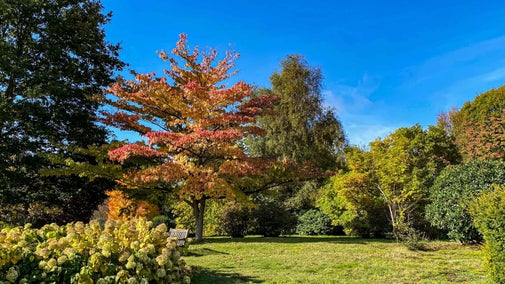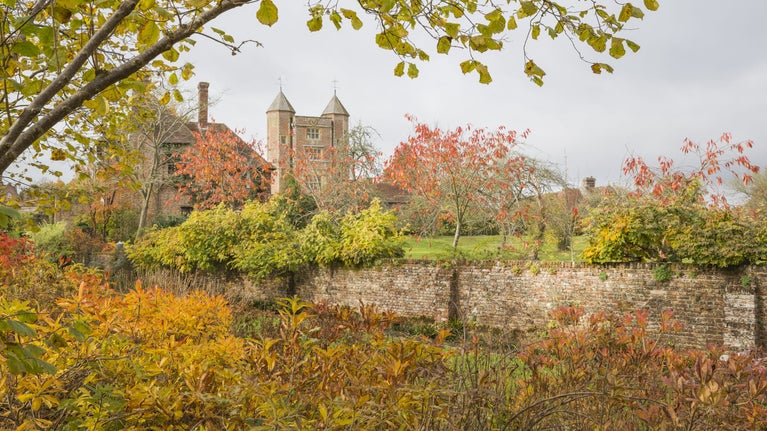
Gardens in Kent
Kent is known as the Garden County of England for a reason. Discover year-round interest in walled gardens, learn top tips from our expert gardeners, enjoy gorgeous blooms, plentiful vegetable plots and inspirational planting schemes – and one of the most famous gardens in the country.
Autumn highlights in the garden in Kent
Our Kent gardens are alive with colour throughout autumn. Early in the season, look out for dahlias in the walled garden at Chartwell and South American salvias at Sissinghurst. Later on, there's an autumn festival at Emmetts Garden and stunning, 100-year-old purple cut-leaved Japanese Maples at Scotney Castle.
The garden at Ightham Mote
The Katsura Cercidiphyllum japonicum (toffee apple tree) near the North Lake unleashes an intoxicating scent of burnt sugar in early autumn. The borders of stable courtyard provide a colourful display well into autumn, in keeping with the courtyard and cottage setting.

The garden at Chartwell
Dahlias and sunflowers bloom in the early autumn sunshine. Admire the 170-year-old Cryptomeria Japonica (Japanese Cedar) towering above the Golden Orfe ponds. Later in the season, the annual pumpkin display is in full throes in the Walled Garden and branches are laden with apples in the orchard.

The garden at Emmetts Garden
As the season passes, the leaves of the Liquidamber styraciflua tree turn deep burgundy. Catch the unmistakable candyfloss scent of the Katsura Cercidiphyllum japonicum (toffee apple tree) in the South Garden. There's an incredible array of fungi specimens such as white spotted fly agaric and stinkhorn.

The garden at Quebec House
Autumn is a time for bright and bold colours in the garden and surrounding trees, with the light shining through the branches turning green leaves to warm shades of red. Anemones remain bright and strong while the rest of the vegetation begins its journey to dormancy.

The garden and estate at Scotney Castle
Look out for yellow tulip trees, and the Oriental bittersweet Celastrus Orbiculatus over the doorway onto the bowling green lawn at the old castle. Stunning, 100-year-old purple cut-leaved Japanese Maples, below the Bastion, are an autumn staple. The Liquidambar styraciflua tree, down by the boathouse in the garden, makes a stunning photo opportunity.

The garden at Sissinghurst Castle Garden
Catch late flowers in the Purple Border in early autumn. As the season settles in, colour abounds in the Nuttery and Lime Walk. Vibrant reds and oranges continue to blaze in the Cottage Garden. Crisp autumnal colours make the Gazebo pop against long-reaching Wealden views.

The garden at Smallhythe Place
Trees and hedgerows come into fruition, laden with a variety of cherries, apples and Kentish filberts and cobnuts. Over 30 varieties of apples grow in the orchard, as well as pears, crab apples and plums. It's managed traditionally, avoiding chemicals, and the meadows beneath the trees are cut just once a year.

Visiting the garden at Bateman's
Asters, hesperantha and the 'autumn crocus' colchicum are the highlights just over the border in Burwash. The Wild Garden is the focus of autumn tree colour, with ornamental trees such as European ash Fraxinus excelsior in their finest throes. Spot varieties of apple, pear, plum, damson, and greengages that would have been available in Kipling’s orchards.

Summer highlights in the garden in Kent
Hundreds of romantic roses, fiery rudbeckia, amber lilies and overflowing borders in heavenly summer gardens
Sissinghurst Castle Garden
Sissinghurst is beautiful year-round, but the garden in summer is quite simply heaven. From June, over 300 different types of old roses take centre stage, filling the garden with scent, colour and good old-fashioned romance. The world-famous White Garden is at its most glorious too, with pure white gladioli, irises, pompom dahlias and Japanese anemones. Head Gardener Troy says “Our team works tirelessly to present Vita Sackville-West’s vision, creating interest and drama with shapes, textures and form”. Beyond the garden, the wildflowers and long grasses in the Orchard create a haven for wildlife.

Chartwell
As the family home of Sir Winston Churchill, their influence is still felt keenly in the gardens. The palette of pastel colours was chosen by Lady Churchill. Chris Lane, Garden & Outdoors Manager, says “her Rose Garden is a sun trap in summer, enhancing the colour and fragrance of varieties such as the soft pink of Rosa ‘Ice Cream’ and Rosa ‘Pink Parfait’”. Throughout June, the Golden Rose Avenue (gifted to the Churchills by their children in 1958), is a riotous promenade of soft, warming hues and intoxicating scent. The Butterfly Walk is inspired by Sir Winston’s love of these winged insects, and they continue to thrive among the salvia, verbena, echinacea, lavender and buddleja.

Emmetts Garden
Plants from around the world fill every corner of this Edwardian garden with colour. From late June the Italianate Rose Garden at Emmetts is filled with an abundance of pink and white blooms. Take a seat among the delicate sweet-scented roses that fill this tranquil scene, and look out for the pink Octavia Hill roses, named after a founding member of the National Trust. A must-see for Head Gardener Ignacio Silva de la Iglesia are the blue cornflower blooms. “They are at their best during the summer months”, he tells us. For stunning views of the Weald of Kent, stop by the South Garden. It offers a beautiful plant collection in a tranquil spot.

Ightham Mote
14 acres of tranquil garden, pleasure grounds, orchard, water features, lakes and woodland surround Ightham’s 700-year old moated manor. One of Head Gardener Richard Burton’s favourite summer spots is the Rosa ‘Rambling Rosie’ archway. “It provides a ‘wow’ moment at this time of year” he says, “framing the entrance to our flamboyant long herbaceous border”. In the sheltered Quiet Garden, take in the wonderful scent of Rosa ‘Gertrude Jekyll’ and relaxing sound of water trickling into the pool. The North Pleasure Grounds put on dazzling wildflower displays in mid to late summer, creating an unmissable photo opportunity.

Scotney Castle
Beautiful blooms fill Scotney’s Picturesque-designed garden throughout summer. The herbaceous beds are alive with colours and sweet fragrances. Kalmias bloom in June after the rhododendrons, whilst heavy flower heads of hydrangeas arch over shady paths. See stunning blue Willow Gentians deep in the quarry and delicate waterlilies on the moat. Senior gardener Andrea Bennett reveals “our new sub-tropical garden in the inner ruins of the old castle opens this summer. The plants have a striking tropical feel, and are hardy enough to withstand the ever-changing weather patterns within the shelter of the ruins”. Check by the garden entrance for Walled Garden veg and cut flowers to take home.

Bateman's
Nestled in the High Weald just over the Kent border, this 12-acre garden includes a river, wildflower meadow, watermill, orchard, lily pond and formal rose garden. Summer highlights for Len Bernamont, Garden & Outdoors Manager, include the many borders. “They’re a riot of colour in summer” he says. “Don’t miss the stunning Delphiniums and Rosa Blue for You”. Author Rudyard Kipling designed the beautiful rose garden and lily pond himself, and the roses here flower all season long. Len adds, “Our vegetable planting starts to come to fruition at this time of year too. Look out for our giant Globo onions and colourful squashes, much of which is used in the tearoom”.

Little garden gems in summer
Small but mighty, these cottage gardens are all the more delightful for their boutique beauty.
Smallhythe Place
The rose garden reaches its crescendo in June, complimented by salvias, geraniums and self-seeded foxgloves and verbena. The long arbor heaves under the weight of over 60 roses, and lush pathways wind through the orchard and nuttery

Quebec House
The clipped formality of the hedges at Quebec House bring formality to this small, but well-formed Georgian garden. See the herb border planted with Lavender, Rosemary, Sage and a whole host of other herbs detailed in Mrs Wolfes 17th century cookbook.

Things to see and do at Stoneacre
Step back in time and explore Stoneacre, a beautifully restored medieval yeoman's house, as well as its attractive garden and country walks in the surrounding area
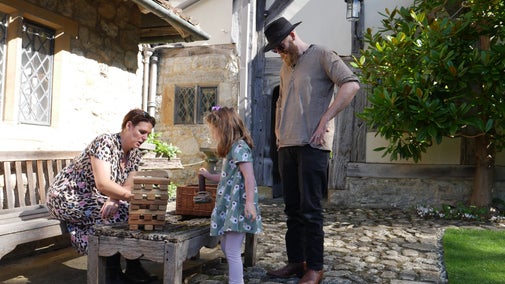
Lamb House
The roses are the true highlight in summer. Look out for the large white blooms of the ‘Rambling Rector’ and large pink flowers of ‘Paul’s Himalayan Musk’. Shrub roses in the courtyard wall border include ‘Crown Princess Margareta’, ‘Eglantyne’ and ‘Absolutely Fabulous’. Many other herbaceous flowers, summer annuals and dahlias provide a kaleidoscopic backdrop.

Spring highlights in the garden in Kent
Seasonal highlights in Kent gardens through spring include daffodils at world-famous Sissinghurst Castle Garden, cherry blossom at Chartwell and native English bluebells in the woodland near Emmetts Garden.
Sissinghurst Castle Garden
Daffodils bring a wave of sunshine to Vita Sackville-West and Harold Nicolson’s world-famous garden in spring. Two varieties fill the orchard floor; a soft yellow flower expected to bloom in early March and a white variety for late April. Apple, pear and cherry blossom covers the fruit trees from early spring, whilst the Lime Walk and Nuttery burst with shades of blue, white, purple and yellow. Fritillaria, more narcissi and crocuses line the stone pathways criss-crossing the garden rooms. Later in spring the magnolia trees unfurl to put on a stunning display; a delicate treat for the eyes and a true symbol that spring has arrived.

Chartwell
The gardens at Sir Winston Churchill’s family home are strikingly beautiful in springtime. Cheerful daffodils including the ‘Winston Churchill’ bloom early. There’s around 30 different varieties of camellia, and azaleas and rhododendrons frame the Golden Orfe ponds. Later, the cut flower beds teem with tulips various fruiting bushes and trees bloom with blossom. Head into the woodland for a bluebell walk on Mariners Hill. In May the wildflower meadow bursts back to life with buttercups, alliums and camassia and bearded iris bob along the Iris Walk. Magnolia trees frame the path on the approach to the house and delicate pink and white cherry blossom blows in the spring breeze.

Emmetts Garden
Emmetts is renowned for its spring colour. In the main garden, the handkerchief tree and the wedding cake tree are particular highlights. Nearly 50 cherry trees create a stunning blossom display, whilst wild cherry grows in the woodland. Native English bluebells fill the woodland surrounding Emmetts in mid-spring (check website for visiting information). Later in the season, the beautiful pink blossom of the Prunus Fugenzo comes into flower in the first or second week of May, underplanted with a carpet of ‘Pink Diamond’, ‘Kingsblood’ and ‘Queen of the Night’ tulips. Meanwhile over 100 species of rhododendrons and azaleas add splashes of vibrant colour.

Scotney Castle
In early spring a sea of ancient narcissus Eystettensis dating back to the 1600s sit under the beech opposite the Queen Mother's Lawn. Blossom is everywhere at Scotney, from Cherry and Amelanchier by the entrance to striking Japanese cherry trees by the Old Castle. The Walled Garden too is filled with fruit blossom, from apple to apricot and peach trees. Bluebells can be seen throughout the garden, with the majority under the two main beech trees, along the drive and throughout the woodlands on the estate. Spring spreads its cheer into the mansion house too, with floral displays for Scotney’s annual Flower Festival. The festival is one of over 100 events happening across the country for the National Trust’s Blossom Week.

Ightham Mote
Cultivated varieties of daffodils bob across the gardens and orchard at Ightham in springtime. Other highlights for April are tulips, scillas and grape hyacinths. Blossom meanwhile can be spotted on the pear, cherry and particularly apple trees in the orchard. Keep an eye out for the spectacular blossom reflection of the crab apple tree by the north lake on sunny days. The fruit, vegetable and herb border along the west wall in the Orchard, newly planted last year, will start to come into its own this spring. Those with buggies and wheelchairs can make the most of the established, renovated paths around the north pleasure grounds and complete hard path around the south lake to explore the whole of Ightham’s gardens.

Bateman's
Just over the Kent border, the sweeping view of the orchard at Bateman’s is especially beautiful from mid-April. Edwardian fruit tree varieties are covered with blossom as they were when author Rudyard Kipling lived here. Don’t miss the cherry border full of crab apple blossom, and spot the newly planted pear trees along Pear Alley. Bateman’s’ growing collection of historic varieties of daffodils from the late 19th and early 20th centuries can be seen in the garden and as cut flowers in the tearoom. Tulips will begin flowering around mid-April in the Mulberry Garden, as primroses and hellebores mingle with bright blue Scilla siberica in the Formal Garden borders.

Smallhythe Place
This compact cottage garden is packed full of interest. Daffodils and snowdrops start to appear all over the garden as Smallhythe reopens for spring. A variety of blossom including apple, pear and crab apple is a delightful sight to see in early spring, as the daffodils come out in full force in the Orchard. Victorian actress Ellen Terry was quite struck with these yellow beauties, affectionately calling Smallhythe Place her "Daffodilly Farm".

Winter highlights in the garden in Kent
The first spots of colour start peeking through in our gardens and countryside in winter. Enjoy a wide variety of uniquely different evergreens at Emmetts Garden, or admire the garden water features at Ightham Mote. Keep your eyes peeled for the pure white of snowdrops as they begin to grow in the new year. By visiting our gardens in winter you help us care for them throughout the seasons.
The garden at Sissinghurst Castle Garden
Discover the shape, design and structure of this iconic garden. Winter aconites, in particular Eranthis hyemalisis, make an early appearance from late January, as snowdrops dot the garden and estate. Crocus on the Lime Walk add a splash of colour too. “Look out for the team rose pruning on walls and in the beds and borders” says head gardener Troy. To get a head start on spring, he suggests bringing a branch or stem of spring flowering shrubs indoors. “Shrubs like forsythia, ribes or winter sweet will begin to flower within a week or two.” The colder season is also perfect for woodland wanders with the sun shining through bare trees. Keep an eye out for birds including robins, redwings and field fares to name a few.

The garden at Chartwell
A winter wander at Chartwell reveals the 'unsung heroes' of the garden. Head gardener Chris says “winter is a great time to discover the garden’s backbone – the terraces, walls and pin-sharp hedges that give it its unique character.” There’s colour in store too. Pink and purple Hellebores (or Christmas Rose) line the path from the visitor centre whilst small, delicate and highly scented white flowers on the Christmas Box sit near Chartwell’s most significant tree, the Japanese Cedar (Cryptomeria japonica). “Tough winter jasmine adds a warm splash of yellow too” adds Chris. Look out for snowdrops including the special 'summer snowflake' snowdrops cropping up around the Gavin Jones waterfalls as a larger, later blooming flower.

The garden and estate at Scotney Castle
The much-photographed views at Scotney Castle look magical with a dusting of frost and a swirl of mist snaking around them. Take a stroll round the garden to catch highlights such as the ivy-like flowers of the Fatsia japonica, and the sweet honey scent of Sarcococca confusa by the blue gated entrance. Look out for creamy white flowers and dark red buds on the Skimmia varieties. Inhale the pale pink, starry flower clusters of the Daphne bholua ‘Jaqueline Postill’. In the West Glade, look up to see towering Redwoods and Scots Pine. Don’t miss historic, winter-flowering heather beds down the ha-ha path, at the entrance to the Quarry.

The garden at Emmetts Garden
The evergreens such as the pines and distinctive spiny Monkey Puzzle tree bring colour to the winter landscape. Bare trees elsewhere create far-sweeping views out over the Kent countryside. The South Garden’s prickly heath bush (Gaultheria mucronate) with its bright pink berries provides a splash of colour. It’s also home to the Blue Atlas Cedar and the drooping branches of the Brewers Spruce. Some roses could stay in bloom until December too. Snowdrops scatter around the garden from the New Year.

The garden at Ightham Mote
With wintry mists and frosty mornings, the garden and estate at Ightham is beautiful this time of year. The sound of running water from the springs and water features provides an atmosphere of intrigue. Pick up a leaflet from Visitor Reception to follow the trails. On the slope, beneath the silvery bark of the birches, a charming display of cyclamen and snowdrops appear alongside the vibrant stems of dogwood and the spotted flowers of hellebores. You might spy our green-fingered garden team at work with tree surveys.

Visiting the garden at Bateman's
The clipped yew hedges, avenue of pleached limes and wall-trained fruit trees look crisp and angular with a frosty layer. Very early bloomers such as Cornus mas and Chimonathus praecox add colour from January. Head gardener Len says “winter is an ideal time to mulch borders and vegetable plots, to give your garden a steady supply of nutrients and organic matter without having to dig or fertilise”. He adds “join us in leaving last summer’s dead stems and seedheads standing until spring – they make great overwintering habitats for ladybirds and solitary bees.” From February snowdrops, beautifully marbled helleborus ‘Pink Beauty’ and pulmonaria begin to emerge, signalling the end of winter.

Garden Events in Kent
Whether you're a seasoned horticulturist or a weekend wanderer, Kent’s garden calendar offers fragrant escapes, hidden gems, and plenty of inspiration all year round.
Inspired by Chartwell Painting Competition and Exhibition
See the winning paintings from the ‘Inspired by Chartwell’ competition displayed in Sir Winston Churchill’s studio alongside his works.
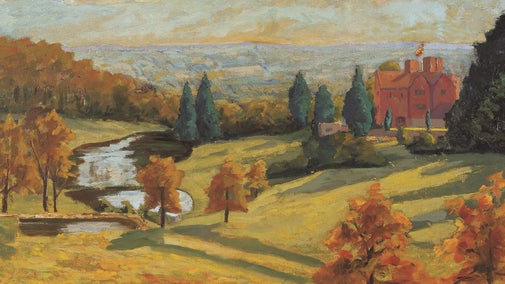
The Sissinghurst Series
The Sissinghurst Series hosts garden experts with a focus this year on the evolution of the English Garden.
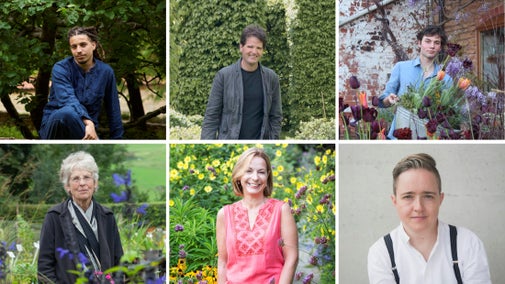
Private morning or evening tours at Sissinghurst
Selected dates until 27 September Experience the magic of Sissinghurst Castle Garden outside regular hours with exclusive morning and evening tours. Visitors can enjoy the garden bathed in tranquil morning light or golden evening twilight before the garden opens to the public. Limited to just 30 guests per tour, book your places and get a rare chance to see the gardens with fewer crowds and a serene atmosphere.
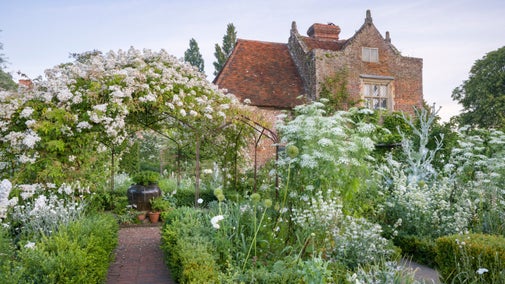
Lord Sackville's private garden open days at Knole
Selected dates until 8 October Book your space to enjoy rare access to Lord Sackville’s private 26-acre garden at Knole. This beautiful space includes sweeping lawns, a walled garden, a medieval orchard, and wild woodland, all with stunning views of the historic house. Pre-booking admission is essential. Tickets can be pre-booked online or purchased on the day, subject to availability. Normal admission to Knole applies (free for members) in addition to a garden event ticket.

Last chance to see outdoor theatre and film in Kent
Don't miss your chance to see open-air drama and film at National Trust places across Kent this summer. At Knole, watch Peter Rabbit outdoor cinema (13 September) or book a ticket for Chartwell's The Great Escaper film screening (5 September).
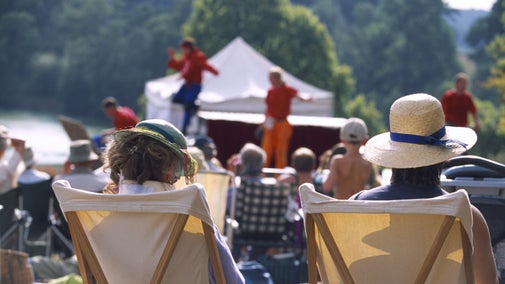
Guided Hop Walks at Scotney Castle
8 to 20 September Join our estate guides for a 2 hour guided walk to Scotney’s hop gardens to view the hops ready for harvesting. Learn about how hops are grown, picked and dried and see how the hop pickers lived and worked. Returning to Scotney to sample beer brewed from Scotney hops.
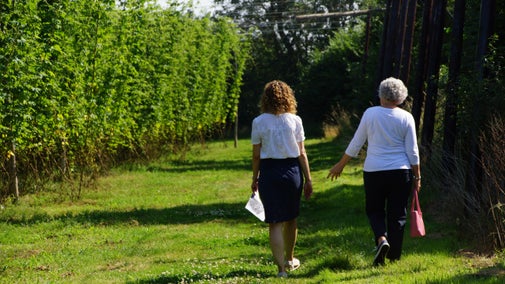
Autumn Festival at Emmetts Garden
10 to 12 October Celebrate the colors and charm of autumn at Emmetts Garden’s Autumn Fair, held under a marquee amid the beautiful garden setting. This seasonal event showcases a selection of woodland, autumn, and botanical-inspired crafts, perfect for finding unique gifts or treats for yourself.
